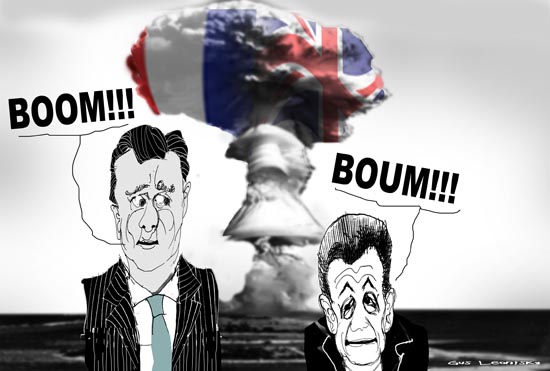Search
Recent comments
- MAGA fools
8 hours 44 min ago - the ugliest excuse to go to war.....
18 hours 54 min ago - morons....
20 hours 46 min ago - idiots...
20 hours 48 min ago - no reason....
21 hours 53 min ago - ask claude...
1 day 1 hour ago - dumb blonde....
1 day 8 hours ago - unhealthy USA....
1 day 9 hours ago - it's time....
1 day 9 hours ago - pissing dick....
1 day 9 hours ago
Democracy Links
Member's Off-site Blogs
napoleon would be disappointed

- By Gus Leonisky at 2 Nov 2010 - 6:01pm
- Gus Leonisky's blog
- Login or register to post comments
franco-anglo nukes
The UK and France are to sign a treaty agreeing to the joint development and testing of nuclear warheads.
The plans will see one centre set up in the UK to develop technology and another in France to carry out testing.
Prime Minister David Cameron and President Nicolas Sarkozy will also outline plans, at a London summit, for a joint army expeditionary force.
Downing Street called the measures "practical", but Labour said they left "big questions" over the UK's defences.
http://www.bbc.co.uk/news/uk-politics-11670247
fighting, on economy...
The defence treaty being signed in London today by Britain and France seems more a matter of practicality than cordiality. Both countries have global military pretensions, complete with nuclear deterrent, aircraft carriers real or imagined and a declared ability to send a force of up to 30,000 ground troops almost anywhere in the world at a few days' notice. But neither country has the money to do this alone.
The blueprints for strategy and defence laid out by the new British government a fortnight ago, and by the newly elected President Sarkozy for France two years ago, are remarkably similar. The two defence reviews envisage roughly the same shape of maritime, air and land forces.
But neither can really be achieved on the funds available. The 10-year rolling budget laid out by the French in the Defence and Strategy White Book envisages an annual expenditure of something just over €30 billion at 2008 prices over ten years. By 2015 this simply will not cover the rising cost of what has been planned.
As for Britain, despite the wholesale cutting of military and civilian personnel, the cutting of the fleet and cutbacks in aircraft procurement in the new defence review of a fortnight ago, it is becoming pretty evident that a great deal in the defence programme is still under-funded and sooner or later more cuts will have to be made.
"We have heard about the big items, like the carriers and the fighter aircraft," a recently retired senior MoD official said last week, "but we haven't had much about the Category C and D items in the equipment programme, where we are still about £4 billion short, and something will have to be done soon."
The two drivers to the new arrangement are the need to economise and maximise the use of force.
Read more: http://www.thefirstpost.co.uk/70921,news-comment,news-politics,defence-treaty-than-means-britain-and-france-fighting-together-it-makes-sense#ixzz1472Z8h25
general sarkozy boat-hook....
By Kim Sengupta, Defence Correspondent
David Cameron declared yesterday that a new chapter has been opened in Britain's relationship with France after the signing of a wide-ranging defence agreement. Questions remained, however, about just how faithful the new partners will be to each other.
A key part of the deal will involve the aircraft carrier of one country defending the national interest of the other. Nicolas Sarkozy, asked whether France's Charles De Gaulle vessel would speed off to the Falklands in the event of a confrontation with Argentina, said: "We are not identical... and I know that there is the Channel between our two countries."
http://www.independent.co.uk/news/uk/politics/sarkozy-launches-new-era-with-gaffe-2123547.html
Gus: everyone knows that a gaffe in French, apart from meaning a funny (or foot-in-mouth) indiscretion, also means a boat-hook, a long instrument to grab something in the sea, on the jetty, anything that needs to be grabbed, like a tricorn fallen overboard... Napoleon favored the bicorn hat...